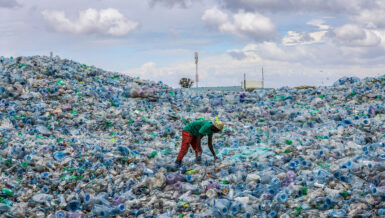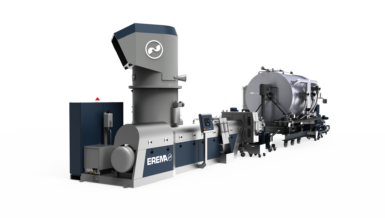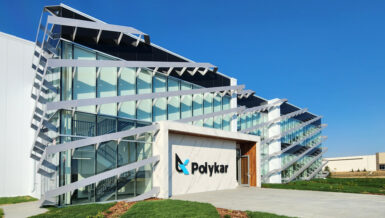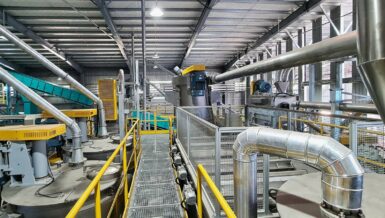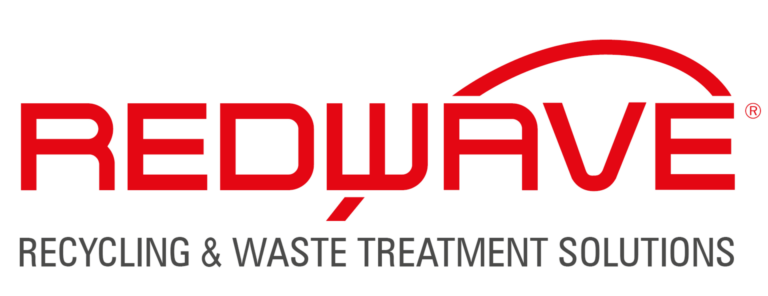Faerch is recognized as a leading manufacturer of food packaging, largely made from PET thermoforming film. Referred to as trays, they are well suited to many applications, especially in the food sector, where food safety, shelf life and a clear view of the packaged product are needed. Faerch produces trays for ready meals, fresh meat, takeaway meals and packaging for dairy products a several of its locations in Europe. They supply well-known food producers and trading companies around the world. The packaging must meet the highest quality standards for direct contact with food, and must meet special functional criteria, such as for transporting liquid food and when food is frozen or heated up in it.
A closed loop for food trays
The trays Faerch produces are fully recyclable and, depending on the PET type (CPET, MAPET or APET), are made of up to 100 percent recycled post-consumer PET (rPET). That is why Faerch is considered a pioneer in tray-to-tray recycling, also due to its cooperation with EREMA. This is because in comparison to bottle-to-bottle recycling, where the circular economy has been successfully well established for 20 years, closing the material loop of PET trays has lagged behind. “For us it was clear that with purpose-specific modification of our flexible VACUREMA® technology, tray-to-tray recycling could become just as much of a success story. Faerch was our first customer to be as convinced of this as we were,” says Christoph Wöss, Business Development Manager at EREMA Group GmbH.

At Faerch’s own recycling plant “4PET” in the Netherlands, PET bales obtained from collection and sorting companies throughout Europe are sorted, washed and recycled. Both post-consumer rPET flakes and pellets are supplied to packaging manufacturers and reused in the company’s own production. “This currently makes us the only integrated recycler in the world capable of recycling used household PET packaging on an industrial scale and turning them back into new trays,” explains Thomas Bak Thellesen, Senior Director Group Sustainability & External Affairs. He backs up this statement with some impressive figures: Trays from all over Europe are recycled to make 1.2 billion PCR PET trays per year. The aim is to quadruple the recycling capacity within the coming years. “Without any compromises in terms of food contact compliance and functional properties,” as Bak Thellesen emphasises: “Quality and sustainability must go hand in hand for us, because this is the only way we can offer our customers circular packaging solutions and drive the change necessary to establish an infrastructure needed to achieve a real circular economy.” To get the PET waste it needs, Faerch offers its own buyback models to customers who are able to collect the packaging again after use, such as airlines and catering companies. “For our production, this waste is a valuable raw material that we know is of the right quality.”
The VACUREMA® recycling process – safe, fast and flexible
Faerch has been relying on the VACUREMA® system with SafeFlake technology from Austrian recycling machine manufacturer EREMA for the recycling process for the trays since mid 2018. The special feature of this set-up is that decontamination, drying and IV treatment already take place on the flake in the vacuum reactor. Only then is the material fed into the extruder. This prevents hydrolytic and oxidative degradation of the melt in the extruder, which in turn is a prerequisite for highly clean, food contact compliant rPET trays with the best IV and colour values. The quality of the rPET pellets remains consistently high even if the parameters of the input material – such as moisture, mixture or bulk density – vary. In addition to these quality aspects, the financial arguments also clearly speak in favour of this recycling process. This is because both the total costs of acquisition and use (total costs of ownership) and the energy consumption are comparatively low. “The specific overall energy consumption of a VACUREMA® Prime system is only 0.295kWh/kg. This is one of the best energy efficiency values1 compared to conventional PET processing lines on the market,” says Christoph Wöss.

Plastic packaging plays an important role in the protection and shelf life of food. Sustainable, circular economy solutions can significantly reduce greenhouse gas emissions and food waste. Faerch’s tray-to-tray recycling solution shows how the circular economy can work. EREMA is convinced that many will follow this example in the near future. This is because, unlike just a few years ago, there is now a broad consensus that the circular economy – and therefore recycling – has an important role to play in the transformation into a climate-neutral, resource-efficient and competitive industry.




